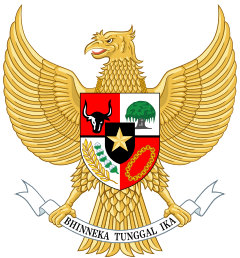Pancasila

Pancasila (old spelling: Pantja-Sila ) means "five principles" ( Sanskrit ). These are the five principles of the national ideology and constitution of the Republic of Indonesia , to which an identity-building and homogenizing effect is intended in the multi-ethnic state .
The five principles of pancasila
The five principles of the pancasila are mentioned in the preamble of the Indonesian constitution:
- The Principle of All-One Divine Rule (Ketuhanan Yang Maha Esa)
- Humanism / Internationalism (Kemanusian / Internationalisme)
- National Unity (Persatuan Indonesia)
- Democracy (Permusyawaratan / perwakilan)
- Social Justice (Keadilan Sosial)
The first principle "of the All-One Divine Rule" is a neologism and represents a predicative use (ke -...- an) of the noun "Lord" (Tuhan) , which makes the recognition of the All-One Divine Rule a principle (Definition: Matti Schindehütte ). This term describes a kind of civil religion , according to which every citizen in the predominantly Muslim Indonesia must belong to one of the five major world religions ( Islam , Christianity , Buddhism , Hinduism , Confucianism ). Beliefs that do not have a written tradition or non-religious ideas are not accepted.
The national coat of arms of the Republic of Indonesia shows the five symbols of the pancasila in front of the mythical Garuda eagle:
- Stern (The Principle of All-One Divine Rule)
- Chain (internationalism)
- Banyan tree (nationalism)
- Banteng Buffalo (Democracy)
- Cotton and Rice (Social Welfare)
history
The Pancasila was first drafted by the later first President Sukarno in his speech on June 1, 1945 before the Committee of Inquiry into the Preparation of Indonesia's Independence (BPUPKI). He wanted to use the five principles to counter the intention of many members of the BPUPKI to make Indonesia an Islamic state . In this case, Sukarno feared the secession of Indonesian regions with a non-Islamic majority, such as Bali . The committee had been convened by the Japanese occupying forces to draft the possible worldview for the Republic of Indonesia to be founded by the leaders of the independence movement . The five principles Sukarno used to draw on the arguments of previous speakers Yamin and Supomo were in the original order:
- Nationalism (Kebangsaan Indonesia)
- Humanism / Internationalism (Perikemanusian / Internationalisme)
- Advice (Permusyawaratan)
- Social Welfare (Kesejahteraan Sosial)
- Principle of the All-One Divine Rule (Ketuhanan Yang Maha Esa)
At the insistence of the representatives of Islamic organizations in this committee, however, the order of the principles was changed by the so-called Jakarta Charter ( Piagam Jakarta ) of June 22, 1945, and the role of religion was strengthened by placing the original fifth principle first. The more far-reaching demand of Muslims to stipulate compliance with the Sharia for their followers was provided for in the Jakarta Charter , but was not included in the constitution. On August 17, 1945, the Republic of Indonesia declared its independence on the basis of the pancasila formula, which is now also in the preamble of the Indonesian constitution.
Since the Suharto dictatorship, the Pancasila seems to have lost its "liberal dynamic".
literature
- Masykuri Abdillah: Responses of Indonesian Muslim intellectuals to the concept of democracy ( 1966-1993 ) . Hamburg 1997, ISBN 3-931567-18-4 (= Austronesia, 2).
- Dieter Becker: The churches and the Pancasila state: Indonesian Christians between consensus and conflict . Verl. Of the Ev.-Luth. Mission, Erlangen 1996, ISBN 3-87214-331-X (= missiological research; NF, 1).
- Benyamin F Intan: Public Religion and the Pancasila-Based State of Indonesia. An Ethical and Sociological Analysis . Peter Lang Pub Inc, 2006, ISBN 0-8204-7603-X (English).
- Achmad Ch Manullang: The State Sociology of the Pancasila . History, 1988, ISBN 3-89247-035-9 .
- Matti J Schindehütte: Civil religion as a responsibility of society - religion as a political factor within the development of the Pancasila of Indonesia . Abera Verlag, Hamburg 2006, ISBN 3-934376-80-0 .
- Andreas Ufen: The constitutional reforms in Indonesia . In: Constitution and law overseas (VRÜ) . 36th vol., 2003, pp. 206-227.
Individual evidence
- ^ Colin Brown: A short history of Indonesia . The unlikely nation? 2nd Edition. Talisman, Singapore 2011, ISBN 978-981-08-8507-6 , pp. 152 .